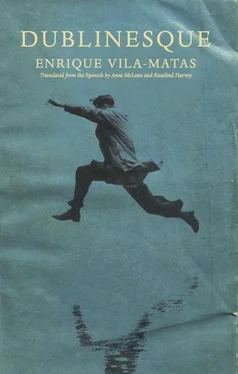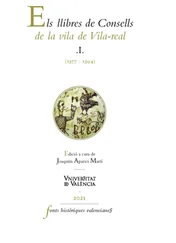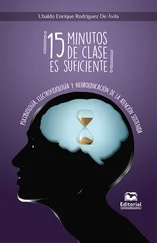Riba feels a nostalgia for the Protestants. He loves their work ethic. He’s commented on this more than once to Javier himself, who, conversely, is fascinated by cold, hard Catholicism. Now that he thinks of it, Javier would be a good person to accompany him on this trip to Catholic Ireland.
Another odd-numbered day comes around and Javier calls at the same time as always. Why not ask him if he fancies coming to Dublin? There’s still time. He hesitates, but finally does. He tells him the day he’s picked to go to Dublin is June 16, and asks him to look at his diary and see if he can join him on his trip. He’s asking him , he stresses that, he asks him. Javier is silent, disconcerted. His reply takes a while. Finally he promises he’ll think about it, but he doesn’t understand why Riba asks him like this, as if he’s begging him. He’ll come if he can, but it’s strange that he’s begging him. Before when they used to go out in the evening together, he never asked for anything; instead he used to insult him for being published by houses other than Riba’s and for even more trivial things.
“It’s so we could be there for Bloomsday,” interrupts Riba in a little voice, designed to elicit sympathy that he has no one who wants to go with him. For a moment, he worries that the word “Bloomsday” might have ruined everything and Javier will start sounding off about James Joyce and his novel Ulysses , which he has never held in particularly high regard, because he was against Joyce’s intellectualism and in favor of a more orthodox kind of writing, along the lines of Dickens or Conrad.
But today it seems Javier has nothing against Joyce, he just wants to know if Riba won’t want to go out at night in Dublin either. No I won’t, Riba says, but I have thought about suggesting the trip to Ricardo too, and as you well know he’s a night owl. A long silence. Down the line Javier seems pensive. Finally, he asks if it’s just about going for Bloomsday.
Here’s danger. The question resounds in Riba’s ears for a fraction of a second. It would be complete suicide to tell Javier about the funeral for the Gutenberg galaxy; he wouldn’t understand right away and perhaps, not understanding, he’d go back on his decision to travel. Javier asks again.
“Is it just about going for Bloomsday?”
“It’s about, first and foremost, going over to the English wavelength,” he replies.
He worries he’s got it completely wrong saying this, but soon discovers just the opposite, as the phrase has had a surprising effect. He hears Javier cough, enthusiastically. He remembers the other day, when they spoke of taking a leap, a nimble English leap, landing on the other side .
On the other end of the line it sounds like a party is going on. He can’t remember the last time so few words did so much. Shortly afterward Javier says that clearly he has been able to reflect on how good it would be for him to distance himself from the culture that has dominated his life up to now. Even, he adds, if it’s just to go in search of other voices and other environments. And he talks, in a strange fury, about taking away the weight of language until it looks like moonlight. And he also talks about the English language, which he says he’s completely sure that in prose as much as in poetry is more malleable and ethereal than French. And as an example he recites a poem by Emily Dickinson, who is certainly aerial and nimble: “ A sepal, petal, and a thorn / Upon a common summer’s morn — / A flask of Dew — A Bee or two — / A Breeze — a caper in the trees — / And I’m a Rose! ”
A long pause.
I’m only against the French, says Javier as he breaks the silence. At least this morning, he explains. Do you want me to say it again? No, says Riba, that’s not necessary. Fine, says Javier, let’s not talk anymore about it, I want to take the English leap with you, I’ll come to Dublin and may poor old France be well and truly buried.
Minutes later, they’re talking about the endless rain that’s starting to become an alarming fact for everyone, when they change, almost without noticing, to talking about Vilém Vok, a writer they both admire so much, each for different reasons. To Riba, Vok is, first and foremost, the author of the fictional essay The Center , to the point where he sometimes relates paragraphs from the book to his desire to undertake a third trip to New York very soon, as this city has always held for him the exact magic of the myths some people need to live by. And in turn The Center has been like a Bible reinforcing this magic, helping him through the times when he needed the idea of New York, not just to live by but to survive. What would become of him without New York? Javier knows the book well and says he thinks he understands why it exerts such a direct influence over his old friend and editor, but also says he himself has always preferred snippets from Vok’s other narrative essay, Some Returned From Long Crossings ( The Quiet Obsession is the altered, though beautiful and elegant title of the English translation).
As always, they end up talking about soccer. It’s a tacit rule between them, but when they start talking about soccer, this just means that the conversation has entered its final stage. They discuss the upcoming European Championship. Javier states categorically that France won’t get very far this year. And Riba is about to ask him if he doesn’t think he’s really got something against the French today, but decides not to complicate things any further. Bye, Javier says suddenly, talk to you soon. And when his friend hangs up, he understands that the Irish trip is no longer an unknown, but rather has started to take shape on the horizon. He goes to the kitchen to drink another coffee and think about it all calmly. A trip with Javier and perhaps with Ricardo — he promised Javier he’d call Ricardo tomorrow — could be just the thing. Ultimately it will help, for example, Celia to stop seeing him as so autistic and closed off, so chained to his computer and indolence. This is one of his main objectives, thinks Riba. That Celia sees he is active, sees he still wants to meet up with people, communicate outside of the web, not live off the memory of the great books he has published, not be content to see himself every day old and stagnant in the mirror.
On the radio, as if the outside world evolves along with his life, “Just Like the Rain,” sung by Richard Hawley, is playing. He observes with amused surprise how he’s gone from a French song, almost without noticing, to music in English. Outside, as if the radio knew the state of the weather or vice versa, it’s still raining, just like the rain . He registers the fact that by now he can almost whisper the titles of songs in English, and suddenly feels as if his name is Spider and he’s lost weight and is already in a bunk in the great Turbine Hall of the Tate Modern in his friend Dominique’s installation. As he gradually approaches, in a way, his sentimental and Sternean center, in search of some sort of equilibrium, the rain in Barcelona becomes still heavier.
He goes over to the largest window in the house. Barcelona is below, at his feet, invisible again. The rain’s persistence over the last few days is strange. He considers what he’d say to someone who asked him what the English leap was. Maybe he’d reply the way St. Augustine did when asked what time was to him: “If no one asks me, I know: If I wish to explain it to one that asks, I know not.” But he thinks that, pressed to respond in some other way, he would end up saying that the English leap is landing on the other side , a pastime it’s up to him to invent on his next trip.
Читать дальше












